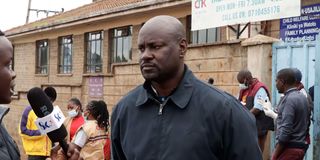How city NGO plans to empower slum women, girls

Jeffrey Okoro, CFK Africa executive director. He says his vision is to champion gender equality and women empowerment in informal settlements where the organisation operates. CFK Africa is an international nongovernmental organisation with offices in Kenya and the US.
What you need to know:
- Mr Okoro says he will continue working with slum communities to improve public health, education, and economic opportunities.
- He will further strengthen initiatives that empower women and girls in Kibera and other informal settlements.
- CFK Africa is an international nongovernmental organisation with offices in Kenya and the US.
The new CFK Africa boss says championing gender equality and women empowerment in informal settlements is his major priority.
Jeffrey Okoro, named the organisation’s executive director last month, says his vision is to ensure men and women are on a par. CFK Africa is an international nongovernmental organisation with offices in Kenya and the US. Mr Okoro has become its fifth executive director since it was founded in 2001.
In an interview with Nation.Africa, Mr Okoro says he will continue working with the community to improve public health, educational outcomes, and economic opportunities in informal settlements. He will further strengthen initiatives that empower women and girls in Kibra and other informal settlements.
He cites access to technical and vocational education and training (TVET) and information communication technology (ICT) training, courtesy of the organisation's ongoing programme.
He says the initiative has seen more than 300 residents enrol for TVET and ICT-related courses, but most of them have been men.
“It is my wish to see many more women benefit from this TVET and ICT programme. I am looking at ensuring about 70 per cent of these opportunities go to young women. It is high time we dealt with the gender gap in TVET courses by ensuring more girls and women are given the opportunities.”
He adds that he will amplify the Kibra Menstrual Hygiene Lab to educate girls on menstrual health and help end period shame. These initiatives, he notes, will also upscale and equip more girls with information and resources on menstruation, and provide sanitary pads and dignity kits to deserving girls.
Mentorship
Curbing teenage pregnancy through mentorship in safe spaces like community schools, churches and engaging parents is also at the top of his agenda. It includes holding sessions with students to educate them on the dangers and effects of teenage pregnancy.
During school holidays, Mr Okoro says the organisation will continue to hold engagements with teachers, parents, and religious and opinion leaders to equip schools and churches to support the initiatives aimed at taming teenage pregnancy and address stereotypes that teenage mothers face in their quest to continue learning.
A resident of Kibera, Mr Okoro first volunteered with the organisation as a youth leader after the 2007-08 post-election violence. He has since risen through the ranks to the top. Along the way, he became a peer mentor, administrative assistant, project officer, programme coordinator, and most recently deputy director.
In 2018, he co-founded the organisation’s Best Schools Initiative with Professor Steve Arnold and has since collaborated with the Massachusetts Institute of Technology to strengthen its research objectives. The programme aims to improve education in primary schools and guide transformative policies for informal settlements globally.
“Jeffrey is that rare person who can inspire and enable others to work for the good of the whole community, which is key to transforming informal settlements in powerful ways,” says Prof Arnold.
Mr Okoro says he is humbled to accept the new position. “As someone who has both benefitted from CFK Africa’s programmes over the years, I am humbled and honoured to be taking on this new leadership role. I have seen firsthand how these efforts provide opportunities to residents of Kenya’s informal settlements, and I look forward to working with the team to expand and enrich them to benefit even more communities in the coming years,” he says.
“When I reflect on where I came from, I see that it’s not just my story, but also the story of the community that shaped me and gave me opportunities I might not have had. I look forward to expanding those same opportunities to help the next generation of young leaders in informal settlements in Kibera and beyond.”
As a 13-year-old, he quit school in Class Eight over lack of school fees. He worked in construction while actively seeking scholarships for three years. Through his persistence and hard work, he earned a scholarship from Guadalupe Catholic parish and finished secondary school.
While working at CFK Africa full-time, Mr Okoro earned his bachelor’s degree in project planning and management from Moi University, and he earned a certificate in conflict analysis from the United States Institute of Peace.
CFK Africa improves public health and economic prosperity in informal settlements in Kenya through integrated health and youth leadership initiatives. Using a participatory development approach, it works directly with residents to develop and implement sustainable programmes.
After marking 20 years of service in Kibera in 2021, CFK Africa began expanding to other informal settlements in Nairobi, Kajiado, Kiambu, Kilifi, Kisumu, Machakos, Mombasa, and Nakuru.





